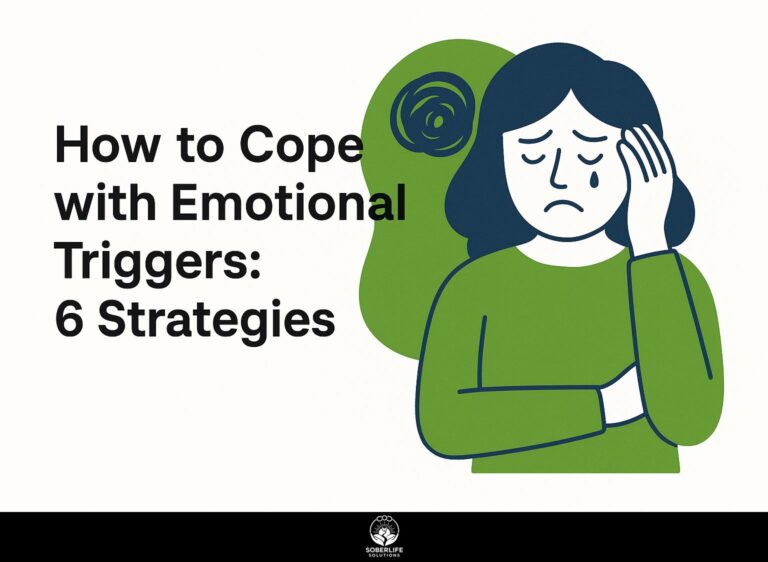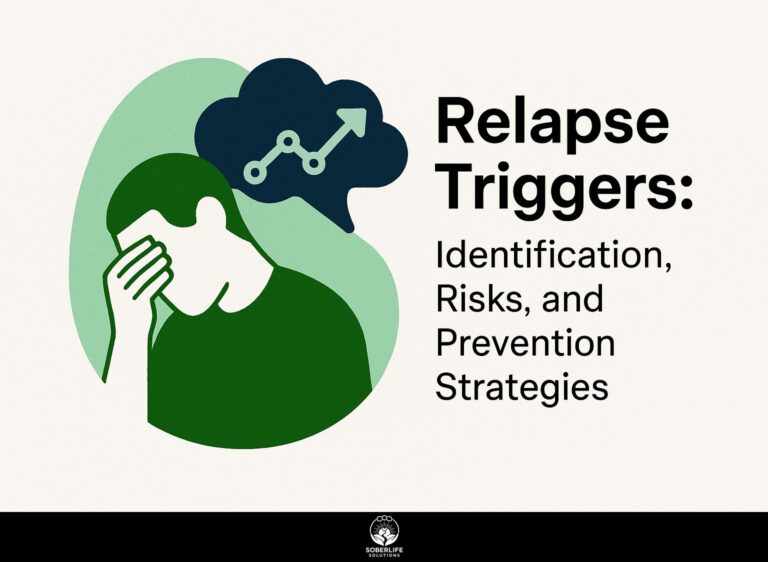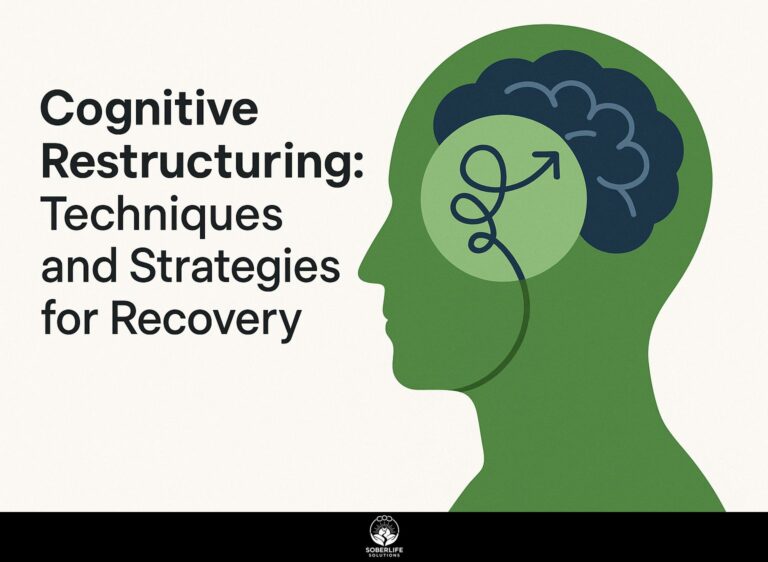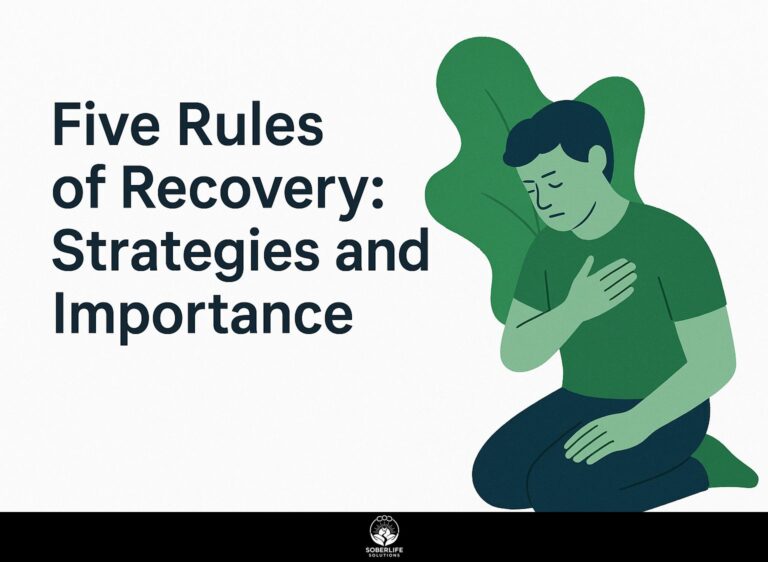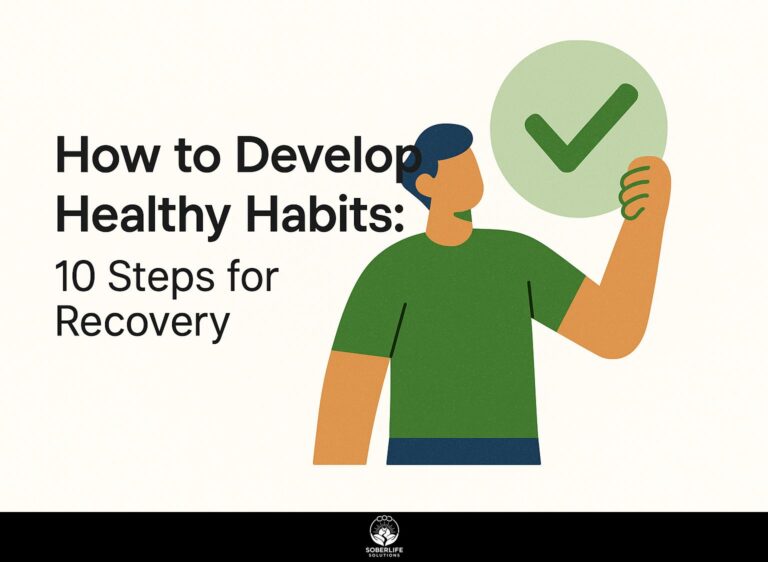Healthy Coping Skills: Benefits for Sobriety
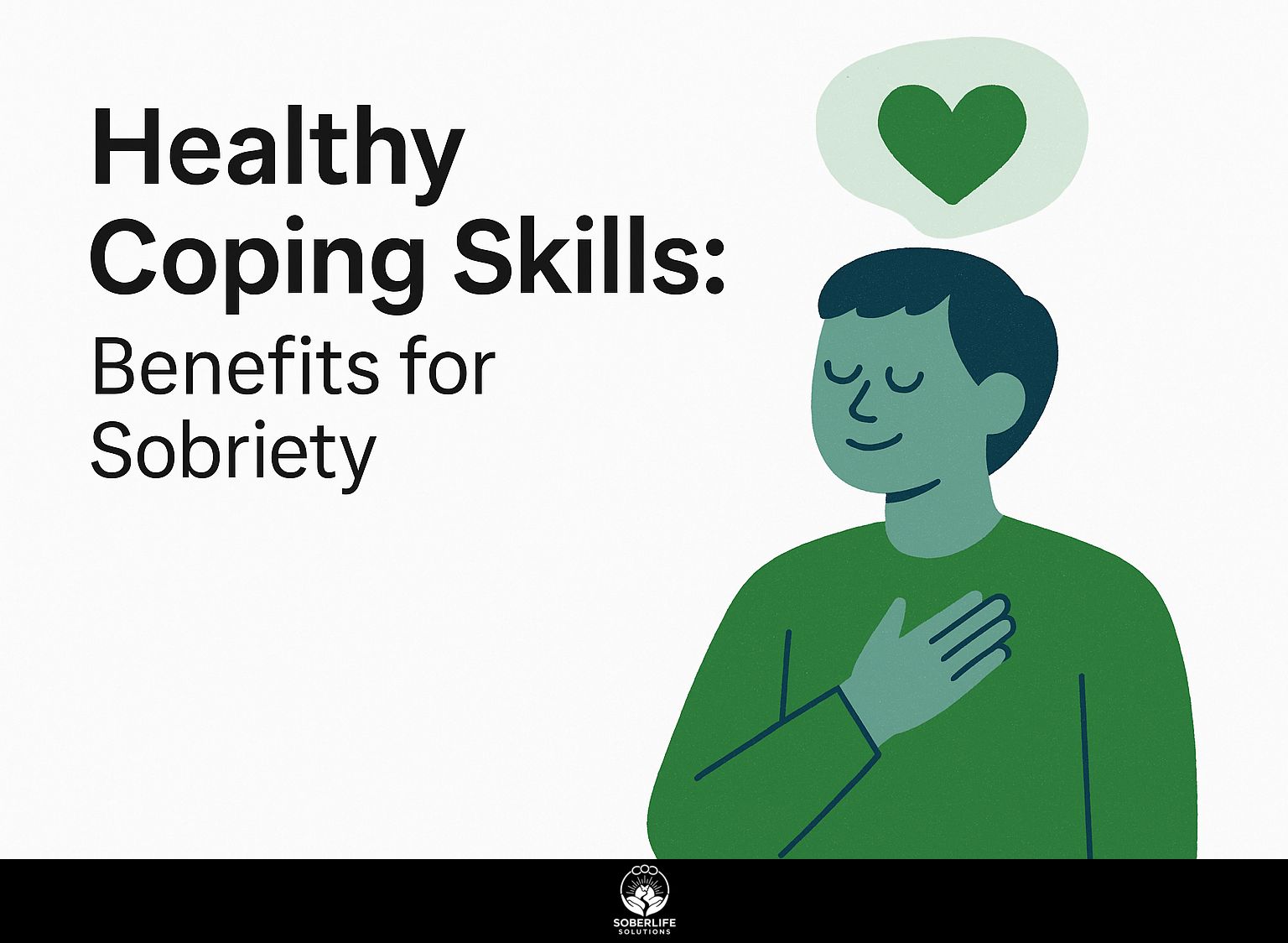
Dealing with drug addiction can be very difficult, but having healthy ways to cope is important for recovery. Good coping methods improve stress control and help people face life’s difficulties without falling back into old habits. Qualitative research shows that these skills play a significant role in addiction recovery by building strength and improving mental health. This article looks at the key benefits of healthy coping skills and provides practical methods to help you on your path to sobriety.
Key Takeaways:
Definition and Importance
Coping skills are techniques that help people deal with stress and emotional difficulties, which are especially important in recovering from drug addiction.
Using effective coping skills can greatly improve emotional control and lower the chance of relapse. For example, mindfulness practices such as meditation can decrease anxiety levels by up to 35%, while regular exercise has been shown to improve mood and overall well-being.
Journaling is another powerful tool, allowing individuals to process their thoughts and emotions, enabling better self-reflection. Using these strategies helps create strength and develop a strong support network, which is important for lasting recovery success. A recent publication by Frontiers in Psychology details how mindful resiliency can be crucial in recovery.
The Role of Coping Skills in Sobriety
Coping skills are essential for staying sober, providing individuals with the techniques needed to handle situations that might cause cravings or stress. For those looking to expand on these strategies, our comprehensive guide on building effective coping skills offers valuable insights.
Understanding Substance Use Disorders
Substance use problems are complicated issues that come from a mix of genetic, environmental, and mental factors. They need different types of treatment.
These disorders often lead to significant mental health challenges, including anxiety, depression, and trauma. Effective coping strategies are essential components of treatment plans.
For instance, cognitive-behavioral therapy (CBT) can help individuals identify and reframe negative thought patterns. Incorporating mindfulness practices, such as meditation, has been shown to reduce stress and improve emotional regulation.
Groups such as Alcoholics Anonymous offer community support, encouraging responsibility and relationships during recovery. According to a detailed overview from SAMHSA, adjusting these strategies based on the person’s specific experiences increases the treatment’s success. Additionally, understanding the importance of addressing co-occurring disorders in alcoholism recovery can lead to more comprehensive and effective treatment outcomes.
The Transition to Sobriety
Moving to a sober life can be challenging, with stress and emotional ups and downs that might lead to relapse if not handled with the right coping skills.
Learning to handle stress and challenges is very important when you first stop drinking. Start by identifying triggers, such as social situations or emotional stress, and create strategies to avoid or manage them.
Journaling is a powerful method, allowing you to express feelings and recognize patterns. Engaging in mindfulness techniques like meditation can help calm your mind.
Consider joining support groups, where shared experiences provide encouragement and accountability. Prioritize physical health through regular exercise and balanced nutrition; both greatly influence mental well-being during this challenging transition.
Types of Healthy Coping Skills
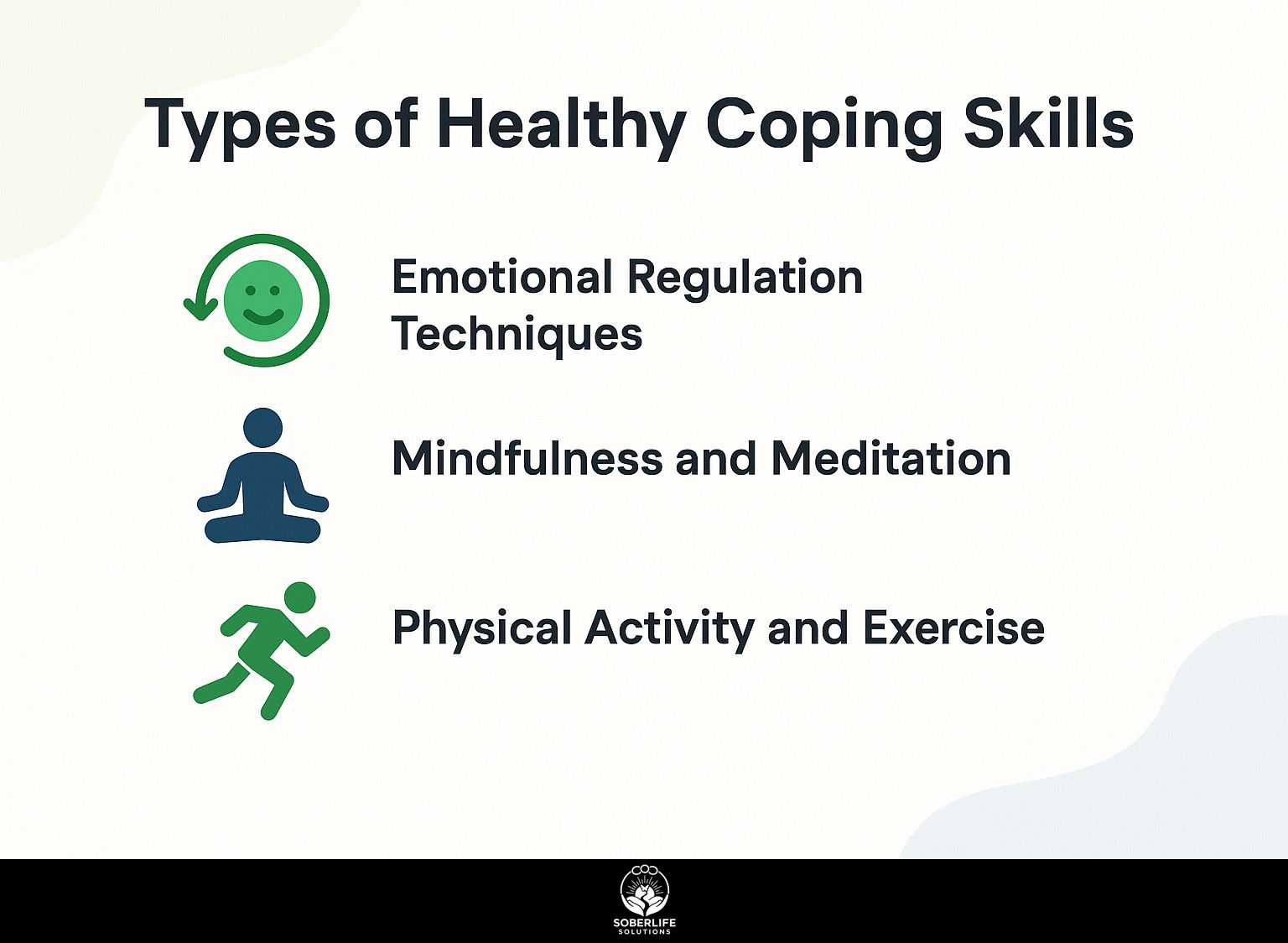
Different healthy ways to cope can strengthen emotional resilience and help in overcoming addiction. For those seeking to enhance these skills, exploring effective strategies for building coping skills can be a crucial step in recovery.
Emotional Regulation Techniques
Techniques such as cognitive-behavioral therapy (CBT) are effective in enhancing emotional regulation, allowing individuals to respond rather than react to stressors.
Incorporating journaling can also significantly aid emotional regulation. For instance, keeping a daily journal helps individuals reflect on their thoughts and feelings, identifying patterns and triggers.
Cognitive-behavioral exercises, like questioning negative thoughts, help people change how they see things. Saying things like “I am capable and strong” can help you feel more confident in yourself.
Regularly using these methods can lead to better emotional health, improving how you understand yourself and handle challenges.
Mindfulness and Meditation
Studies indicate that mindfulness and meditation can significantly reduce stress and cravings, making them useful strategies for assisting people in recovering from addiction.
Integrating mindfulness into your recovery involves practical techniques and tools. For example, some research published by JAMA Network highlights the effectiveness of mindfulness training compared to traditional recovery support, particularly for opioid use.
Headspace provides a wide selection of guided meditations designed for addiction recovery, costing $12.99 each month. Similarly, Calm features an array of 7-day programs focusing on craving management and emotional resilience at $14.99 per month.
Studies indicate that users experienced a 60% reduction in anxiety and improved emotional regulation.
By spending just ten minutes each day on these practices, you can build awareness, helping with your recovery.
Physical Activity and Exercise
Exercising can improve mood and lessen feelings of anxiety and depression, which are often experienced by people recovering from substance use problems.
Regular exercise, like a fast-paced 30-minute walk or playing on a local sports team, can greatly improve mental health.
Studies, including a 2018 review in ‘Substance Use & Misuse’, show that physical activity helps mitigate withdrawal symptoms and cravings. Incorporating activities like yoga or tai chi improves mindfulness, further aiding recovery.
To build a structured routine, try setting weekly goals, like exercising three times a week. This can help create a lasting habit and encourage social connections that aid in recovery efforts.
Benefits of Healthy Coping Skills
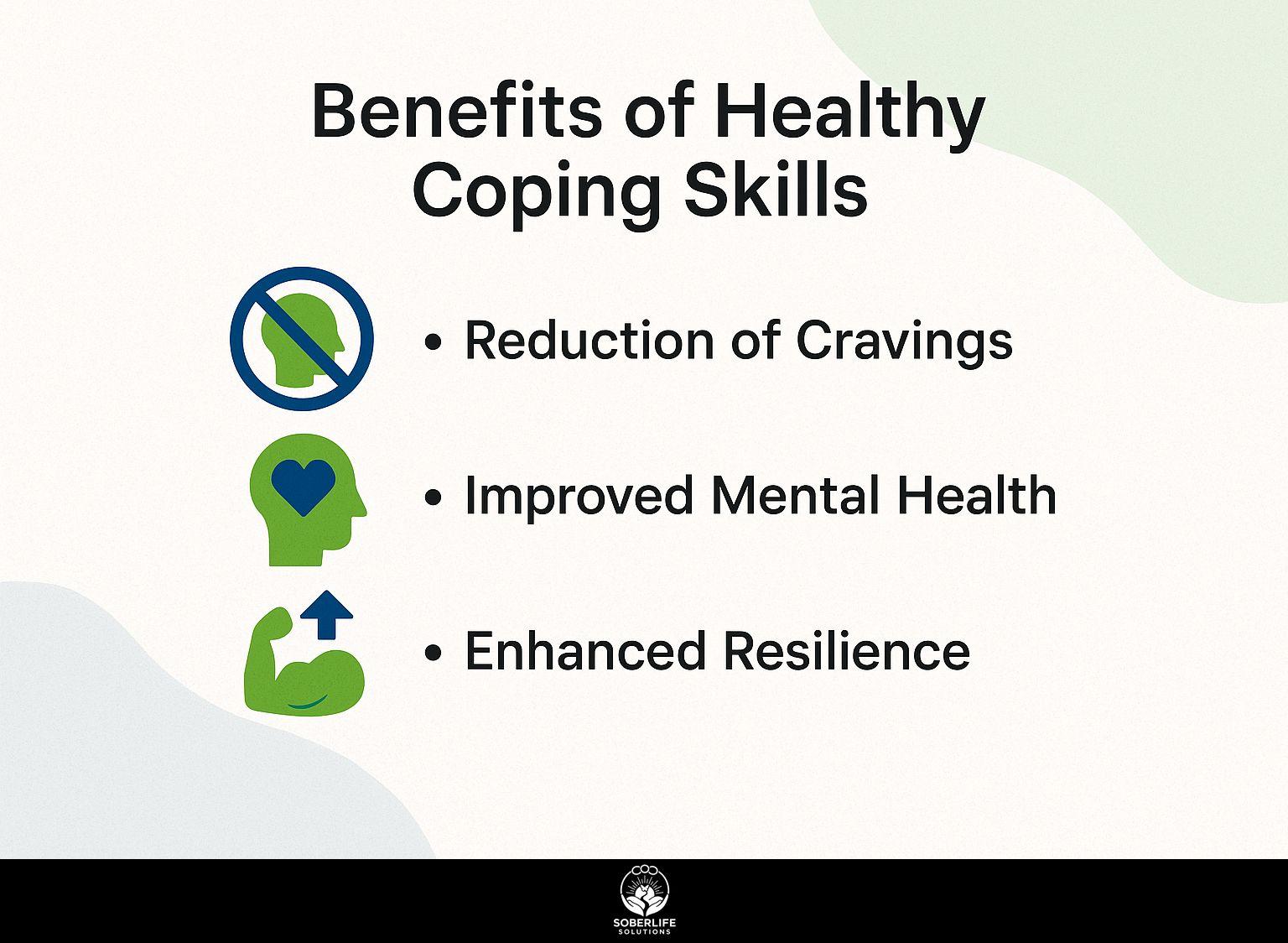
Using healthy coping skills can provide many benefits, greatly improving recovery and overall well-being. For a deeper understanding, see also Coping Mechanisms: Strategies for Alcoholism Recovery.
Reduction of Cravings
Healthy coping skills can lead to a 40% reduction in cravings, enabling individuals to manage triggers more effectively.
There are various methods to develop these coping skills.
-
Mindfulness meditation, for example, allows individuals to become aware of their cravings without acting on them; a daily practice of just 10 minutes can lead to significant improvements.
-
Exercise-such as a brisk walk or a home workout-releases endorphins that can distract from cravings.
-
Writing in a journal is a helpful method; by noting down emotions and causes, people can better see and understand their habits.
Using these methods can help people manage their cravings more effectively.
Improved Mental Health
Research shows that individuals who actively employ coping strategies experience a significantly lower incidence of anxiety and depression during recovery.
For instance, a recovery center in California reported that clients who engaged in mindfulness meditation and cognitive behavioral therapy (CBT) techniques saw a 40% decrease in depressive symptoms within the first three months.
Tools like the Headspace app for mindfulness and self-help books on CBT can help people learn these skills.
Centers often share feedback from graduates who say that regular use of these coping methods improved their mental health and gave them lasting skills for handling stress well.
Enhanced Resilience
Building healthy ways to deal with stress can improve strength, helping people recover better from difficulties.
To build resilience, consider engaging with your community through local support groups or volunteer opportunities. These connections build a feeling of community and offer comfort.
Practicing mindfulness techniques like meditation can help individuals manage stress. Journaling your thoughts and feelings is another effective method, allowing for self-reflection and emotional release.
Incorporating structured routines can also promote stability during chaotic times, further strengthening your ability to recover from challenges.
Implementing Coping Skills in Daily Life
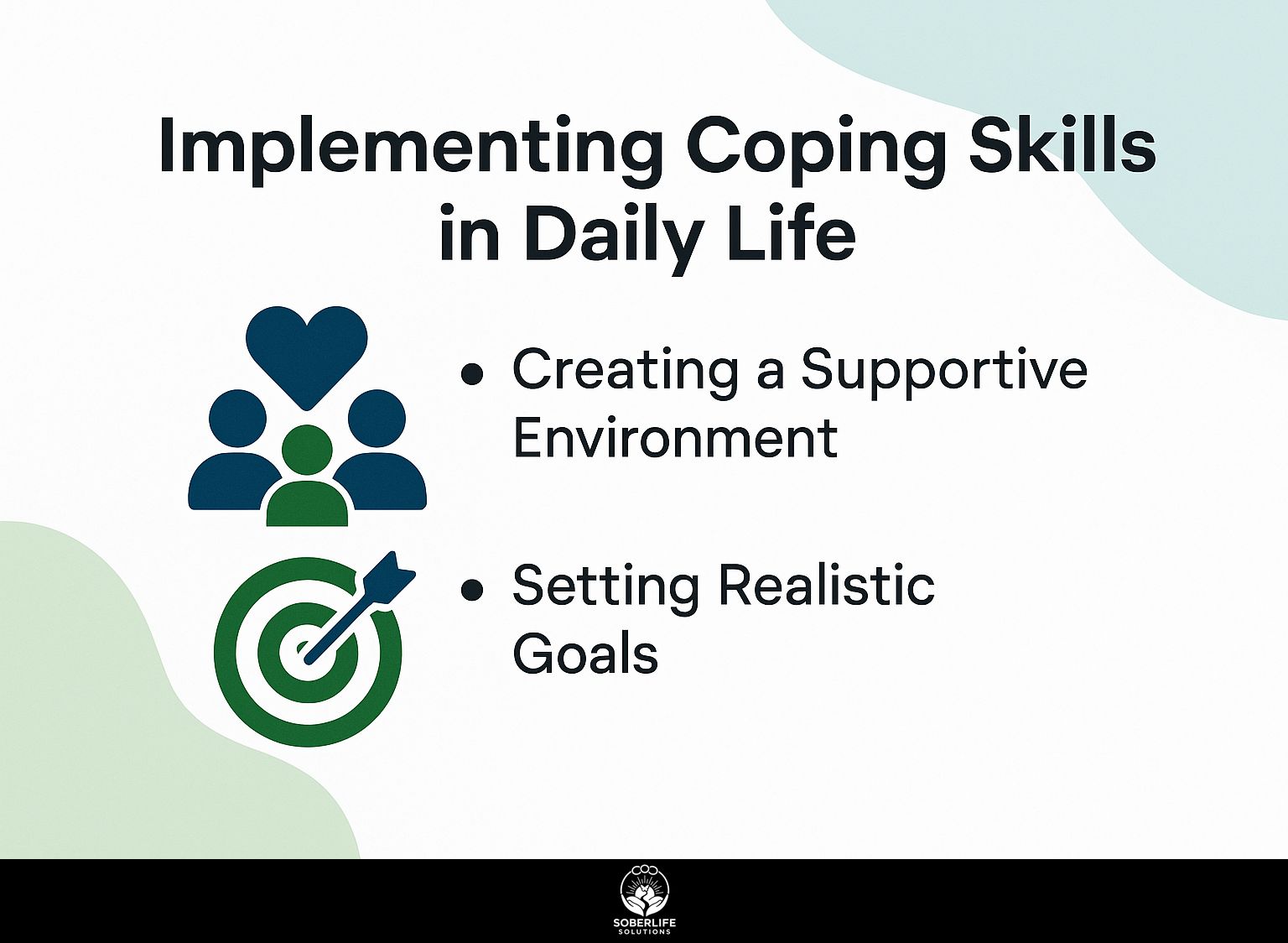
Including healthy coping strategies in daily routines is important for staying sober and maintaining mental well-being over time. This aligns well with the principles outlined in our resources on effective strategies for building coping skills.
Creating a Supportive Environment
A caring setting can help recovery, giving people the support and tools needed to stay sober.
- Being part of groups like SMART Recovery can help you stay responsible by offering support from others and regular meetings to discuss difficulties.
- Use local resources like rehabilitation centers that regularly have workshops and counseling designed for personal needs.
- Setting personal goals, sharing progress with friends or family, and utilizing resources like online forums can further strengthen one’s support network.
These steps give both emotional support and practical methods to manage the recovery process successfully.
Setting Realistic Goals
Setting practical and achievable goals can greatly increase motivation and focus during recovery, making it easier to handle.
The SMART goals method helps you set practical and clear recovery goals. For example, instead of saying, ‘I want to stop drinking,’ a clear goal would be: ‘I will go to three Alcoholics Anonymous meetings each week for the next two months.’
This goal is specific, measurable, achievable, relevant, and time-bound. Focus on monitoring your progress by journaling daily emotions and triggers to solidify your recovery path.
Divide large goals into smaller tasks to make them feel more achievable and strengthen your dedication.
Frequently Asked Questions
What are healthy coping skills and how do they benefit sobriety?
Healthy coping skills are positive and effective ways to deal with stress, emotions, and difficult situations. They benefit sobriety by providing alternatives to using substances as a means of coping. These skills promote long-term recovery and help individuals develop a healthier and more fulfilling lifestyle.
What are some examples of healthy coping skills that can benefit sobriety?
Some ways to handle stress in a healthy way include exercising, meditating, doing art, writing in a journal, enjoying nature, and getting support from friends and family. These activities can help manage stress, reduce cravings, and improve overall well-being, promoting a sustainable recovery from addiction.
How do healthy coping skills help in maintaining long-term sobriety?
Healthy coping skills provide individuals with healthy and constructive ways to manage triggers and difficult emotions that can lead to relapse. By using these skills, individuals can build resilience and strengthen their ability to handle challenging situations, promoting a long-lasting sobriety.
Are there any specific benefits of using healthy coping skills for sobriety?
Yes, there are many benefits of using healthy coping skills for sobriety. These skills can lower stress and anxiety, make mental and emotional health better, raise self-awareness and self-control, and improve overall life quality. They can also make relationships and communication better, leading to a more satisfying recovery.
Can healthy coping skills be used in combination with other forms of treatment for addiction?
Absolutely. Healthy coping skills can be used in combination with other forms of treatment for addiction, such as therapy and support groups. These skills can work alongside other treatments to improve their effectiveness, giving people a balanced and complete way to support their recovery process.
How can I start incorporating healthy coping skills into my daily routine for sobriety?
The first step is to identify which coping skills work best for you. Start by trying out different activities and see which ones help you manage stress and emotions in a positive way. Create a plan to include these skills in your daily routine, and remember to practice them often. You might find it helpful to talk to a therapist or join a support group. They can teach you healthy ways to deal with stress and show you how to apply them in your recovery from addiction.

